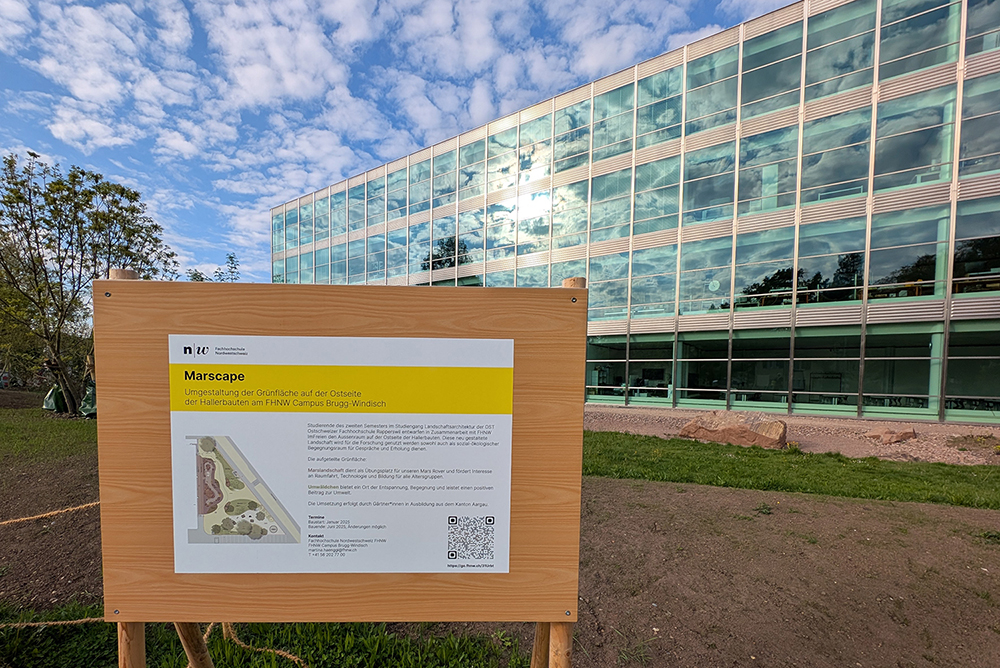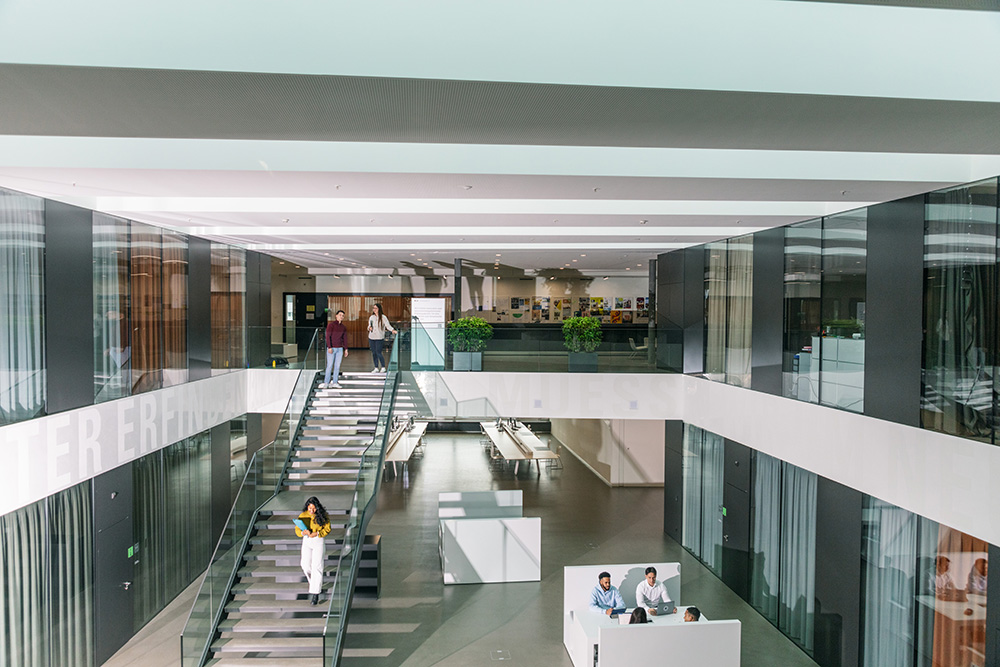Students from the Eastern Switzerland University of Applied Sciences (Campus Rapperswil) have created a Martian landscape in front of the Hallerbau on the Brugg-Windisch campus in collaboration with the FHNW. This will serve as a training ground for the FHNW Mars rover and promote “interest in space travel and technology” (information sign on the construction site, own translation). According to the website, the FHNW rover team consists of “an interdisciplinary group of students from the School of Engineering and Environment and the School of Computer Science”. The so-called “Umwäldchen” with new plantings offers a place for relaxation and encounters and makes a “positive contribution to the environment” (information sign on the construction site). According to its website, the FHNW is “active in the development of observation instruments, components and manufacturing processes for the aerospace sector”. In addition to the aforementioned universities, the FHNW School of Business is also active in this field. In 2021, SPACE THEA was developed, a voice assistant for Mars flights, which was presented at the AAAI Spring Symposia at Stanford University in 2022 and attracted the attention of NASA. In 2025, the focus will be on social robots for Mars flights with a view to ICSR 2025.
Bao in Olten
From April 15 to 17, 2025, the elective module “Social Robots” once again took place at the FHNW School of Business – as it has so often since 2021. The participants were information systems students from various locations. And once again, a GPT specialized in the topic was available, namely Social Robotics Girl. Prof. Dr. Oliver Bendel repeatedly had her explain the facts and then made additions. She also asked questions to the audience and provided a few laughs with her competent and nerdy manner. The robots at the demo included Unitree Go2 (called Bao), Pepper, Alpha Mini, Booboo, Furby, Cozmo, and Aibi. With the exception of Pepper, they all come from the Social Robots Lab, which is privately funded by Prof. Dr. Oliver Bendel. Unitree Go2 was used to explore not only the seminar room on the Olten campus, but also the area in front of it. The robotic four-legged friend ran forwards and backwards, jumped, stood on its hind legs, drew a heart in the air, and impressed with various dance interludes. When designing their own social robots – the students complete this task in groups – they again worked with the five-dimensions model by Oliver Bendel and image generators.
Social Robots in Olten
The elective module “Social Robots” by Prof. Dr. Oliver Bendel took place from November 4 to 6, 2024 at the Olten Campus. Tamara Siegmann (with the online presentation of the paper “Social and Collaborative Robots in Prison”) was invited as a guest speaker. She made it clear to those present that every member of the university can make a contribution to research. On site were Pepper and NAO from the FHNW Robo Labs as well as Unitree Go2, Alpha Mini, Cozmo, Furby, and Booboo (aka Boo Boo) from Oliver Bendel’s privately funded Social Robots Lab. Unitree Go2 – also called Bao (Chinese for “treasure, darling”) by the lecturer – and Booboo were particularly well received. At the end of the elective module, the students designed social robots – also with the help of generative AI – that they found useful, meaningful or simply attractive. The elective modules have been offered since 2021 and are very popular.
A New School of Computer Science
All four cantons supporting the FHNW approved the global budget of CHF 204.7 million in September and October 2024. This also clears the way for the new Hochschule für Informatik FHNW (assumed name FHNW School of Computer Science) with a main location in Brugg-Windisch and a secondary location north of the Jura (Basel-Landschaft and Basel-Stadt). It is due to be founded at the beginning of 2025 and will begin its studies in fall 2025. From this date, it will take over the existing computer science courses at the FHNW School of Engineering. During the 2025 – 2028 performance mandate period, the plan is to establish further education and training courses and develop research and development activities. The aim of the new university is to educate and train the IT specialists required by business and administration in Northwestern Switzerland. The degree programs and courses offered by the FHNW School of Business in business information technology, artificial intelligence, and robotics are not affected by this change. The FHNW School of Computer Science will be the tenth university under the umbrella of the University of Applied Sciences and Arts Northwestern Switzerland (Photo: Pati Grabowicz).
AI Ethics at the FHNW
Prof. Dr. Oliver Bendel has been teaching information ethics, AI ethics, robot ethics, and machine ethics at the FHNW for around 15 years. He is responsible for the “Ethik und Technologiefolgenabschätzung” (“Ethics and Technology Assessment”) module in the new Business AI degree program at the FHNW School of Business in Olten. Here, the focus is on AI ethics, but students will also learn about robot ethics and machine ethics approaches – including annotated decision trees and moral prompt engineering. And they will use information ethics, including data ethics, to analyze and evaluate the origins and flows of data and information and engage in bias discussions. Last but not least, they will delve into technology assessment. Oliver Bendel also teaches the “Ethik und Recht” (“Ethics and Law”) module in the Business Information Systems degree program at the FHNW School of Business in Olten (which he took over in 2010 as “Informatik, Ethik und Gesellschaft”, later renamed “Informationsethik”), the “Recht und Ethik” (“Law and Ethics”) module in the Geomatics degree program at the FHNW School of Architecture, Construction and Geomatics in Muttenz, and “Ethisches Reflektieren” (“Ethical Reflecting”) and “Ethisches Implementieren” (“Ethical Implementing”) in the Data Science degree program at the FHNW School of Engineering in Brugg-Windisch. His elective modules on social robotics are very popular (Photo: Pati Grabowicz).




